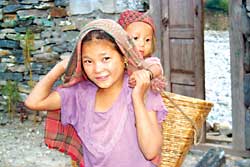 Forty eight-year-old Subhadra Dangi has given birth to 19 daughters since here marriage about 32 years ago. She is pregnant again, and is hoping it will finally be a son. Two of Subhadra's daughters died very young, and seven of the remaining 17 are married. Last year, Subhadra gave birth to twins: both daughters.
Forty eight-year-old Subhadra Dangi has given birth to 19 daughters since here marriage about 32 years ago. She is pregnant again, and is hoping it will finally be a son. Two of Subhadra's daughters died very young, and seven of the remaining 17 are married. Last year, Subhadra gave birth to twins: both daughters. "It was god's wish that all 19 were daughters, I have to accept that till I get a son," she says. Subhadra's husband, Sher Bahadur, is delighted that his wife is pregnant again. "We hope it will be a son, because we need him to look after us in our old age," he says.
A local astrologer told Gita Pakharin that her 12th child would be a son, but like all her previous offsprings it was a daughter. Two of Gita's daughters died, three are married. "How unfortunate we are," says the 56-year-old Gita. "It seems we are just not fated to have a son."
Family planning programs have made no inroads in these backwaters of Nepal's eastern Panchthar district. Bachu Kumari Kadayal, a 61-year-old woman from Ranitar VDC, chased away health workers advocating family planning from her village. Bachu Kumari is no ordinary woman, she has given birth to an astounding 30 children, an accomplishment that has given her stature and respect in the district. Bachu Kumari had two miscarriages and five of her children died.
"We thought that the rest of the children might also die and continued producing children as per god's wish," Bachu Kumari told us. "We were not rich, but we managed to raise our children." After her last child was born 12 years ago, Bachu Kumari has been busy raising her brood. Still carrying loads and working in the fields, her health seems none the worse for it.
"I delivered so many children without anybody's help, I don't see why people need doctors," she says.
Elsewhere in Nepal, it is the lack of health care that contributes to the country's high maternal and infant mortality rates. Sabitri Regmi of Kerabari in Gorkha district gave birth to 10 daughters and four sons. No one ever told her about family planning. Five of her daughters and two sons died young.
But where there is awareness about family planning, Nepal's paternalistic society does not permit women to have a say in reproductive matters. Gita Devi Bartaula in Sindhuli knew about contraception, but was compelled to give birth to 26 children. "My husband could not go against his father and he did not use any means of family planning," Gita Devi says.
Gita was married to Bharat Raj in 1948 and gave birth continuously about once every two years until 1992. Fifteen of her 26 children died young.
It is a tradition among some communities in Nepal for couples to remarry sitting on the roof of their house if they have 20 children. In Basewar of Sindhuli district, Rikman Nepali's wife is pregnant with their 20th child and they are preparing for a remarriage ceremony. "We are looking forward to it," says Rikman, speaking on behalf of his wife whose health has deteriorated.
The couple now have grandchildren, but the burden of raising so many children has meant that the family is not well off. Rikman can't even grow enough food to feed his family for a month, and now regrets not taking his fellow villager's advice to go to the district hospital for family planning.
Radio Nepal has been exhorting families that "two children are god's blessing" for decades. It doesn't seem to have made an impression on Sarkini Kunwar of Kamala Khoch, also in Sindhuli. She has given birth to 17 children, and has no regrets. "It is difficult to raise them, but once they grow up and start earning, they take care of the family." Even if she had known about family planning during her teenage years, it is unlikely Sarkini and her husband would have adopted it.
(Krishna Adhikari/Sancharika Samuha)


